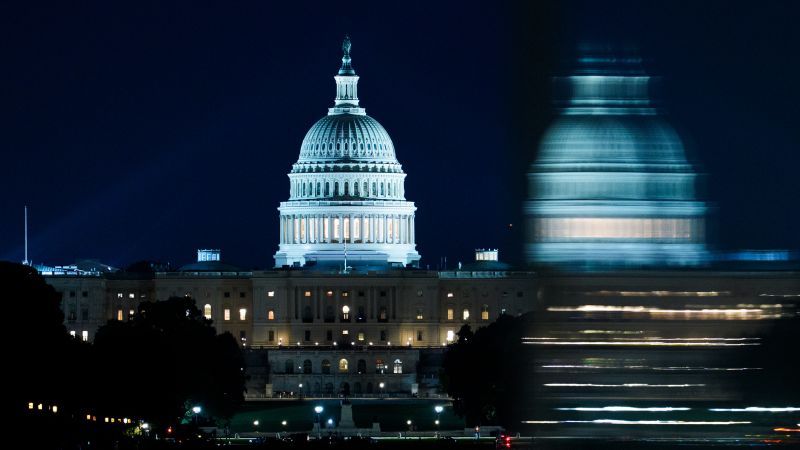
Republican Sen. Mike Lee offered some colorful commentary Wednesday night about Democrats and the government shutdown.
“It’s going to harm them,” the Utah senator said. “Because Russ Vought, the OMB director, has been dreaming about this moment, preparing this moment, since puberty.”
He added: “This is going to be the Democrats’ worst nightmare.”
Lee was alluding to the Trump administration’s threats and actions to use the shutdown to target federal workers and things they say are favored by Democrats. Neither Vought nor President Donald Trump have been at all subtle about their intent to do this. Trump has said he’s tasked Vought with determining which “Democrat Agencies” to cut. And Vought has already announced a series of funding halts that targeted 16 states, all of them blue.
But by Thursday, House Speaker Mike Johnson offered a view of Vought’s motivations that was almost diametrically opposed to Lee’s.
“Russ does this reluctantly,” the Louisiana Republican said.
“He takes no pleasure in this,” he added.
And just in case Johnson hadn’t been clear the first two times: “That is not a fun task, and he is not enjoying that responsibility.”
The speaker’s statement highlights what seems to be unease among some Republicans about the Trump administration’s rather blatant efforts to politically weaponize a shutdown.
Fears that Trump would use a shutdown to cut things that “don’t align with the president’s values,” as press secretary Karoline Leavitt previewed Thursday, were a big reason Democrats caved during the last shutdown debate earlier this year.
But this time Democrats decided to try and call the administration’s bluff. And there are signs some Republicans are getting cold feet about the administration making good on its threats.
Sen. Kevin Cramer of North Dakota has been especially blunt.
In comments Wednesday, he cautioned that this effort could cost Republicans the “moral high ground” in a shutdown debate they should otherwise win.
“There’s the political ramifications that could cause backlash,” Cramer told CNN’s Manu Raju, adding: “I just don’t like squandering that political capital.”
Sen. Susan Collins of Maine called the administration’s targeting of $18 billion in infrastructure projects in New York – home to the top Democrats in both the House and the Senate – “totally unacceptable.”
Rep. Mike Lawler of New York publicly criticized the same move.
Sen. Thom Tillis of North Carolina told Reuters that the administration needs to be “really careful with that, because they can create a toxic environment here.”
And even Senate Majority Leader John Thune has seemed to throw up a caution flag.
Asked Thursday by Politico whether Vought’s efforts were muddying the political waters, the South Dakota Republican responded: “The only thing I would say about that is yes, and we don’t control what he’s going to do.”
There are a couple ways to read this.
One is that it’s a bit of a good cop-bad cop routine. The lawmakers who need to figure a way out of this shutdown can keep amicable relations with their Democratic counterparts by gently suggesting this isn’t their preferred approach, even while those actually in charge of the cuts bring down the hammer.
But the other is that Republicans genuinely fear what this could portend – and are subtly urging the administration to back off.
And to the extent it’s the latter, they might have good reason to fear a redux of Department of Government Efficiency cuts.
DOGE wound up being broadly unpopular among the public, after all, and its architect Elon Musk even more so.
A March CNN poll showed Americans said 62%-37% that they feared the DOGE cuts would “go too far and important federal government programs will be shut down.”
Other polls have shown around 6 in 10 Americans disapproved of DOGE.
The most recent polling – from Quinnipiac University in June – showed these negative views have lingered in about the same place. About twice as many Americans called Musk’s and DOGE’s performance “poor” (45%) as said it was “excellent” (20%).
And beyond that, there are the electoral dynamics.
While the 16 states Vought targeted Wednesday were all blue, those states are also disproportionately home to what are expected to be competitive House races in the 2026 midterms.
In fact, of the 39 House districts rated as “toss-up” or leaning slightly toward one of the parties by the Cook Political Report, more than 40% were in those 16 states.
The DOGE cuts were also a significant subplot in perhaps the biggest election of 2025 thus far: the Wisconsin Supreme Court race. After Musk inserted himself into that contest in a major way, the Democratic-aligned candidate won by 10 points.
Trump has also taken remarkably little care to sell cuts related to the shutdown in a palatable way. Perhaps the best evidence of that was his missive Thursday morning on Truth Social in which he described Vought as being “of PROJECT 2025 Fame.”
More like infamy. Project 2025 was an albatross in 2024. One poll late in the campaign showed 57% of registered voters had a negative view of the Heritage Foundation playbook, compared to just 4% who had a positive one. Trump basically sought to completely disown it, at least publicly during the campaign.
The president has since hired many prominent figures involved in Project 2025. And despite his supposed distancing from it, the project’s imprint is all over his administration.
But while that’s helped Trump expand his power, its move-fast-and-break-stuff style hasn’t done the GOP a lot of political favors.
Democrats seem to have come around to the idea of letting Trump’s threats play out and challenging the administration to do its worst. House Minority Leader Hakeem Jeffries on Wednesday even responded to Vought’s halting of New York’s infrastructure funding by deriding his “baseless threats.”
It’s a game of chicken within the broader game of chicken that is the government shutdown. Now we wait to see who was right.



